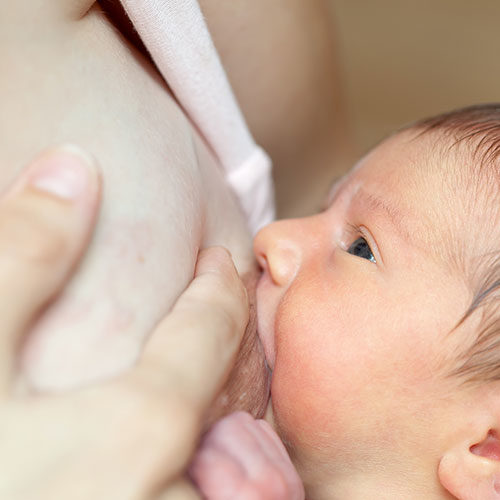What is Reflux?
The very common phenomenon of babies spitting up some milk right after or in between feeds is called ‘Reflux’.
Many infants spit up milk. It can be curdled sometimes. This is observed commonly and the reason is that – the digestive system of the babies are still not mature and therefore the milk, even after entering the stomach, can flow back up into the oesophagus (more commonly referred to as the food-pipe, connecting mouth and stomach) and from there into the mouth of the baby, causing the spit-ups. In most cases, these spit-ups are in small quantities and do not cause any discomfort to the baby. These babies are called happy spitters. They are seldom bothered by the spit-ups and are otherwise developing well. In such situations, reflux is not a reason to worry. Parents can still use some of the following tips to tackle the spit-ups.
Tips to address mild to moderate Reflux:
- If there’s an overactive letdown, change positions to ensure that baby is comfortable and isn’t guzzling down too much milk at once.
- Positioning the baby in such a way that her head is higher than the rest of her body while nursing.
- The latch should be checked to minimize swallowing of air while nursing.
- Frequent, short feeds are better in controlling reflux as compared to nursing sessions with big intervals wherein the baby gulps large quantities at once causing load on the stomach.
- Keeping the baby in upright position and burping after every feed, and during or in-between feeds if need be; can help.
- Avoid giving tummy time immediately after feeding.
It is often mentioned that little bit of spitting up every now and then is common and normal. There isn’t a cause of concern unless it is projectile vomiting. Let’s consider when spit-ups are not normal.
Excessive Spit-ups:
Excessive spit-ups are not normal when coupled with a lot of discomfort in the baby with low weight gain and poor growth. Some of the reasons for excessive spit-ups involve the following.
- Oversupply (This can be addressed and does not require any treatment for the baby). See our article on oversupply here.
- Overactive and forceful letdown (This too does not require treatment for the baby). This is often a part of oversupply. Read our article on oversupply here.
- Food sensitivity/Allergy (Allergy to foods that the mother might be consuming in large quantities could be one of the reasons for excessive reflux in babies. Analysing the mother’s diet and eliminating the food causing the issue solves the problem)
- GERD (Gastroesophageal Reflux Disease) can be responsible for excessive spit-ups and projectile vomiting. Read more about it here.
- Pyloric Stenosis (It is a rare medical condition that requires a medical diagnosis through ultrasound or barium swallow. The treatment usually involves surgery through laparoscopy or pyloromyotomy).
References :
https://www.llli.org/breastfeeding-info/reflux/
https://kellymom.com/hot-topics/reflux/
https://themilkmeg.com/category/baby-reflux-and-spitting-up/

Wish to speak with a member of our team who is a certified lactation professional and also an experienced breastfeeding mother, click on this link.
Medical Advice Disclaimer
THIS WEBSITE DOES NOT PROVIDE MEDICAL ADVICE.
The information, including but not limited to, text, graphics, images and other material contained on this website are for informational purposes only. No material on this site is intended to be a substitute for professional medical advice, diagnosis or treatment. Always seek the advice of your physician or other qualified health care provider with any questions you may have regarding a medical condition or treatment before undertaking a new health care regimen, and never disregard professional medical advice or delay in seeking it because of something you have read on this website.
Disclaimer
We understand and acknowledge that parents and babies can be of various genders on a spectrum of LGBTQI+. Families come in diverse flavours. However, in our articles, for the sake of simplicity and convenience, we will be referring to the breastfeeding parent as the mother and using the female pronouns- ‘she’ and ‘her’ for babies. Babies can be nourished and nurtured in different ways and while we have used the terms breastfeeding and nursing, we recognize that parents can opt to chest feed or finger feed.
We don’t have conflicts of interest and declare, and we are compliant with the WHO code of marketing of breastmilk substitutes and the IMS act.
In case you find any information on this website that needs to be updated, please write to us at info@bsim.org.in






